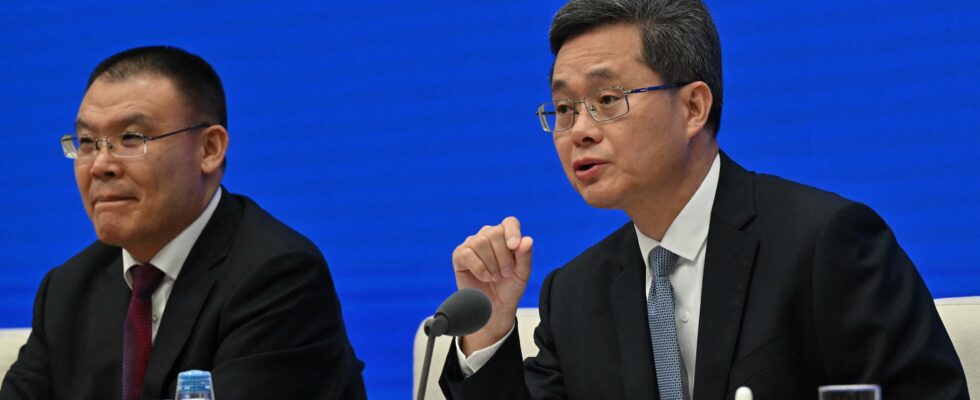China unveiled, this Friday, November 8, one of the most ambitious plans in recent years to reduce the debt of local authorities and revive its economy, also with a view to potential trade tensions with Donald Trump.
The announcement was made at the end of an important parliamentary meeting which took place in Beijing, at a time when the country is struggling with a laborious post-Covid recovery, weighed down by sluggish consumption and a real estate crisis. . Donald Trump’s victory in the US presidential election was closely followed by Chinese officials as top parliamentary officials gathered this week for a crucial meeting.
At the end of this gathering, state television CCTV announced on Friday that they had approved the “most powerful debt reduction measure in recent years” by deciding to raise “the debt ceiling of local governments by 6 000 billion yuan” (around 780 billion euros).
This decision will serve to “replace existing hidden debts” and allow these communities to “better develop the economy and ensure the livelihoods of the population,” the channel underlined. Hidden debt is borrowing for which a national or local government is owed, but which is not disclosed to its citizens or other creditors, according to the IMF.
Threat from Trump
The Chinese Minister of Finance, Lan Fo’an, clarified in Beijing during a press conference that this increase will take place over three years to the tune of “2,000 billion yuan per year from 2024 to 2026”. The debt of local authorities raises concerns about the stability of the economy as a whole. It amounts to 5.6 trillion dollars (5.2 trillion euros), according to the government. The International Monetary Fund (IMF) estimated it last year at 8.4 trillion dollars (7.8 trillion euros).
The decision was taken after having “taken into account the international and national development environment as a whole and ensuring that we can guarantee the proper functioning of the economy and finances”, underlined the minister. “Since the beginning of the year […] new situations and problems have appeared in economic operations”, he conceded. This measure will notably allow local authorities to borrow more to buy vacant land or unfinished real estate projects, in order to get the real estate sector out of its current slump.
The main leaders of Parliament also adopted a new energy law on Friday, with the aim of “promoting […] carbon neutrality” – the objective that the Asian giant has set for 2060.
Donald Trump has promised to impose 60% tariffs on imported Chinese products. A threat which, if carried out, risks worsening the situation for the Chinese economy. According to many analysts, China wants to cushion the potential explosion with strong economic measures.
“Close to a turning point”
The parliamentary meeting, initially scheduled for the end of October, was probably postponed to allow “political decision-makers to react” to an election of Donald Trump, commented Lynn Song, economist for the ING bank.
But the Republican tycoon’s return to the White House is “not necessarily a bad thing for China, as it may push Beijing to take bigger stimulus measures,” said Qi Wang of UOB Kay Hian. Wealth Management, on the social network But many investors had criticized the absence until now of strong measures.
In the streets of Beijing on Friday, Chinese interviewed by AFP said they were experiencing economic difficulties. But they expressed cautious optimism. A 32-year-old man, Han Xi, said he started a new job at an auditing company this week after resigning from his previous company in April. “It took me more than six months to find a job. […] Many companies are laying off workers at the moment,” he emphasizes. If the economy continues to slow down, “I think we are close to a turning point,” he wants to believe.
